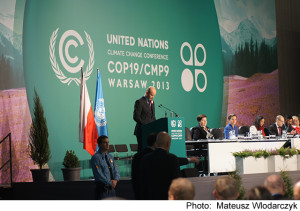
Business must lobby governments to fight climate change, according to the United Nations. On November 14th as part of the current Warsaw climate conference, the UN issued a new report titled, “Guide for Responsible Corporate Engagement in Climate Policy,” urging active business participation in the UN climate crusade. But is this the best course for business to serve customers and protect the environment?
Representatives from more than 190 nations are meeting in Poland, to lay the groundwork for a binding agreement on greenhouse gas emissions by 2015. The tough issues include the size and timing of emissions cuts and contributions to the $100 billion climate fund, to be paid annually to developing nations in 2020. But negotiations are not going well.
China surpassed the United States in 2007 as the largest emitter of greenhouse gases, but does not want to rein in emissions. India has 300 million people without access to electricity and wants other nations to make cuts. Developing nations demand that industrialized nations make deep emissions cuts and large contributions to the $100 billion climate fund, for past emissions sins. Industrialized nations are reluctant to pursue further emissions reductions without participation from developing nations.
Since the failure at the 2009 Copenhagen Climate Conference, global climate negotiations have been adrift. The Kyoto Protocol expired at the end of 2012 without a follow-on emissions treaty. The UN Framework Convention on Climate Change and other organizations blame corporate influence as “a major stumbling block to progress on global climate change initiatives.”
The new UN report on corporate engagement will be highlighted in a special session of the conference on November 19. The report calls for companies to lobby governments to support a “global legal agreement on climate change.” Firms must push for a “carbon price throughout the global economy.” But last week, new Australian Prime Minister Tony Abbott introduced a bill to repeal that nation’s hated carbon tax, a major setback for international efforts.
The report was produced for the UN by leading environmental groups, including the World Resources Institute, the Carbon Disclosure Project, the World Wildlife Fund (WWF), Ceres, and The Climate Group. All of these organizations receive major funding from companies who strive to be responsible corporate citizens.
 For example, for many years Coca-Cola has funded the environmental efforts of the WWF. The company runs the “Arctic Home” promotional campaign, featuring a white Coca-Cola can with an image of a mother polar bear and her cubs, raising over $3 million to date for the WWF. Children all over our nation are breaking piggy banks to send money to save the bears.
For example, for many years Coca-Cola has funded the environmental efforts of the WWF. The company runs the “Arctic Home” promotional campaign, featuring a white Coca-Cola can with an image of a mother polar bear and her cubs, raising over $3 million to date for the WWF. Children all over our nation are breaking piggy banks to send money to save the bears.
In 2007, the US Geological Survey published a 30-year detailed study of polar bear populations on the north coast of Alaska, using bear capture, tagging, and electronic collaring to track bear populations. The study concluded that, although ice had declined 30 percent in the region over the period, bear populations increased by 30 percent. So both the polar bears and the WWF are doing quite well.
To be good citizens, some companies are voluntarily buying electricity from expensive wind and solar sources. Shareholders accept this profit-reducing activity, believing this contributes to slowing man-made global warming. But according to the International Energy Agency, wind and solar supply less than one percent of global energy needs, and coal-fired energy is growing.
Last week, Japan announced that it was changing its national 2020 emissions target from a decrease to an increase from the year 1990. Both Japan and Germany replaced nuclear plants with coal-fired plants in the wake of the Fukishima nuclear disaster, so emissions for both nations are growing.
In 2011 UPS began using biodiesel at major US shipping hubs. The company stated, “This project helps us reduce our dependence on fossil fuels with the added benefit that it will also reduce air pollution and carbon emissions.” But mounting evidence shows that business use of biodiesel is negative for both people and the environment.
A recent study by the International Food Policy Institute concludes that current biofuel policies do not reduce CO2 emissions. United Kingdom’s Chatham House points out that biofuel efforts increase “the level and volatility of food prices, with detrimental impacts on the food security of low-income food-importing countries.” Rain forests are being replaced in Malaysia and Indonesia with palm oil plantations for biofuel.
Since climate change is dominated by natural, not man-made factors, there is no United Nations agreement that will have a measureable effect on Earth’s climate. There is no corporate policy that will have a measurable effect on icecap size, sea level rise, the frequency or intensity of hurricanes or storms, droughts, or floods. No UN policy, however broadly endorsed by nations and companies, will have a measurable effect on global temperatures.
For a real difference and not just a public relations difference, companies should direct efforts toward measures that solve real problems. Innovative products and services for humankind, reduction of real pollutants (not carbon dioxide), and support for efforts to bring electricity, clean water, sanitation, health care, and prosperity to developing nations should be corporate goals, rather than futile efforts to halt climate change.
Originally published in The Washington Times
Steve Goreham is executive director of the Climate Science Coalition of America and author of the book The Mad, Mad, Mad World of Climatism: Mankind and Climate Change Mania.
